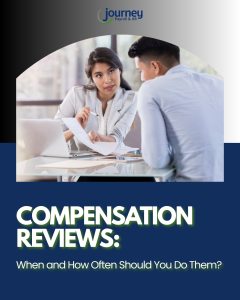Paychecks keep people employed. Fair pay keeps them engaged.
Compensation reviews aren’t just a formality they’re a vital part of retention, equity, and budgeting. But many businesses still struggle with one simple question:
 How often should we review employee pay?
How often should we review employee pay?
Here’s what you need to know to build a smart, intentional compensation review process.
Why Compensation Reviews Matter
Employees talk. They research. And they know when their pay isn’t keeping up with the market or with their value.
Regular compensation reviews help companies:
- Stay competitive in their industry
- Recognize and retain top performers
- Avoid pay equity issues
- Plan for raises, bonuses, or promotions in advance, not reactively
Skipping reviews? That silence can get expensive.
How Often Should You Review Compensation?
There’s no one-size-fits-all answer, but here are the most common approaches:
Annual Reviews
- Most common frequency
- Tied to performance reviews or budget cycles
- Useful for cost-of-living adjustments and merit increases
Risk: Can feel slow or outdated if market pay is shifting quickly.
Mid-Year Check-Ins
- Helpful to spot inequities or market shifts before year-end
- Good timing for growing teams or businesses in competitive industries
Best practice for fast-growing companies or those expanding roles quickly.
Real-Time or Trigger-Based Reviews
- Happens after promotions, major achievements, or job scope changes
- Keeps high performers engaged without waiting 12 months
Requires more manager awareness and flexible payroll planning.
Market-Based Reviews
- Done quarterly or biannually using benchmarking tools or payroll analytics
- Helps ensure your roles are staying in line with industry compensation trends
Great for industries where talent is in high demand and wages move fast.
Key Factors That Should Trigger a Compensation Review
- Role or responsibilities significantly change
- Employee performance exceeds expectations
- Market data shows wage inflation
- Internal pay equity issues arise
- Company has a strong year and wants to reward loyalty
How Payroll Supports the Process
Your payroll system plays a crucial role in:
- Running reports on current pay structures
- Identifying gaps or anomalies
- Tracking past raises and upcoming eligibility
- Ensuring compliance with wage laws, especially in multi-state operations
Final Thought: Pay is Communication
You don’t just compensate people with money you communicate value, fairness, and opportunity.
Whether you review compensation once a year or once a quarter, the key is consistency and transparency.